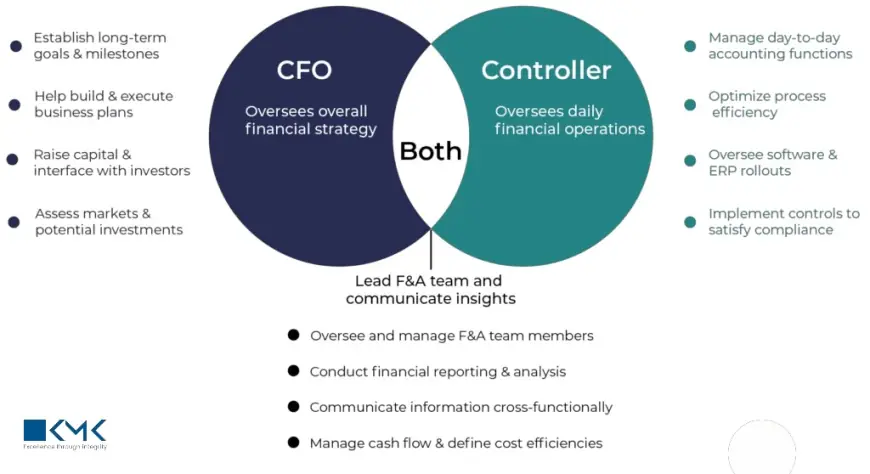What US Startups Should Know About Financial Controllers and Finance Managers
Financial Controllers and Finance Managers come in. These two roles are essential for ensuring that your startup’s finances are not just managed, but strategically optimized for growth. But what exactly do they do, and when should you hire them? Let’s break it down.

Launching a startup in the United States is exciting — but it also comes with financial challenges that can make or break your business. While founders often focus on product development, marketing, or fundraising, having the right financial leadership is just as critical. That’s where Financial Controllers and Finance Managers come in. These two roles are essential for ensuring that your startup’s finances are not just managed, but strategically optimized for growth. But what exactly do they do, and when should you hire them? Let’s break it down.
Understanding the Roles: Financial Controllers vs. Finance Managers
Although the titles might sound similar, Financial Controllers and Finance Managers have distinct responsibilities:
-
Financial Controller
Think of the Financial Controller as the “financial guardian” of your business. They oversee accounting, ensure accurate financial reporting, maintain compliance with regulations, and safeguard company assets. Their role is detail-focused, ensuring every cent is tracked correctly. -
Finance Manager
The Finance Manager plays a more forward-looking role, focusing on budgeting, forecasting, cash flow management, and financial planning. They help you understand where your business is headed financially and how to get there more efficiently.
Why Startups Need These Roles Early On
In the early days, many startup founders try to handle finances themselves or rely on basic bookkeeping. But as revenue grows and expenses multiply, financial complexity increases quickly. Here’s why having Financial Controllers and Finance Managers early on is a smart move:
-
Accurate Financial Reporting
Investors and stakeholders expect reliable numbers. Financial Controllers ensure reports are precise and compliant. -
Better Decision-Making
Finance Managers provide data-driven insights for strategic moves — whether it’s entering new markets, adjusting pricing, or scaling operations. -
Cash Flow Protection
Cash flow is the lifeblood of startups. These professionals help avoid cash shortages that can stall growth. -
Investor Confidence
Strong financial oversight boosts credibility during fundraising rounds.
Key Responsibilities of Financial Controllers in Startups
A Financial Controller in a startup setting typically handles:
-
Preparing monthly, quarterly, and annual financial statements
-
Ensuring tax compliance and regulatory adherence
-
Managing accounting systems and internal controls
-
Overseeing accounts payable/receivable processes
-
Conducting audits to minimize financial risks
They make sure the financial foundation is strong so your business can grow without running into compliance or reporting issues.
Key Responsibilities of Finance Managers in Startups
A Finance Manager focuses on:
-
Creating and monitoring budgets
-
Performing financial forecasting and scenario analysis
-
Managing investment strategies
-
Optimizing cash flow and working capital
-
Supporting mergers, acquisitions, or fundraising efforts
Their work ensures you are not just “tracking” numbers but also using them to drive profitability and growth.
When Should a Startup Hire a Financial Controller or Finance Manager?
Here are a few signs it might be time to bring one or both on board:
-
You’re raising or have raised venture capital and need investor-ready reports.
-
Monthly revenue and expenses are becoming complex to manage.
-
Your startup is preparing for rapid scaling.
-
You need better insights for long-term planning.
Many startups begin by outsourcing these roles on a part-time or virtual basis, then bring them in-house as operations expand.
Benefits of Having Financial Controllers and Finance Managers
Startups that invest in these roles gain several competitive advantages:
-
Stronger Compliance – Reduced risk of penalties from missed filings or inaccurate reporting.
-
Data-Driven Growth – Clear financial insights lead to smarter strategic moves.
-
Improved Operational Efficiency – Better budgeting and cost control.
-
Increased Investor Appeal – Demonstrates financial maturity and professionalism.
In-House vs. Outsourced Financial Leadership
For early-stage startups, outsourcing Financial Controllers and Finance Managers can be cost-effective. Virtual accounting and finance services give you access to experienced professionals without the full-time salary commitment.
Outsourced experts often bring experience from working with multiple startups, providing valuable perspective and best practices you might not get from an in-house hire.
How to Choose the Right Financial Controller or Finance Manager
When selecting financial leadership for your startup, consider:
-
Experience with startups – They should understand the fast-paced, resource-limited environment.
-
Technical expertise – Proficiency with accounting tools, ERP systems, and forecasting software.
-
Communication skills – Ability to explain complex financial data in simple terms.
-
Strategic mindset – Not just maintaining books but contributing to growth plans.
Final Thoughts
For US startups, Financial Controllers and Finance Managers are more than just “finance people” — they are strategic partners in growth. While their roles differ, both are vital for ensuring your business has a solid financial foundation and a clear roadmap for the future. Whether you hire them in-house or outsource them virtually, the investment pays off in better decision-making, improved investor relations, and a stronger path to profitability. If you’re a startup founder looking to scale, now might be the perfect time to bring these experts on board and give your business the financial leadership it deserves.
What's Your Reaction?
 Like
0
Like
0
 Dislike
0
Dislike
0
 Love
0
Love
0
 Funny
0
Funny
0
 Angry
0
Angry
0
 Sad
0
Sad
0
 Wow
0
Wow
0
















































